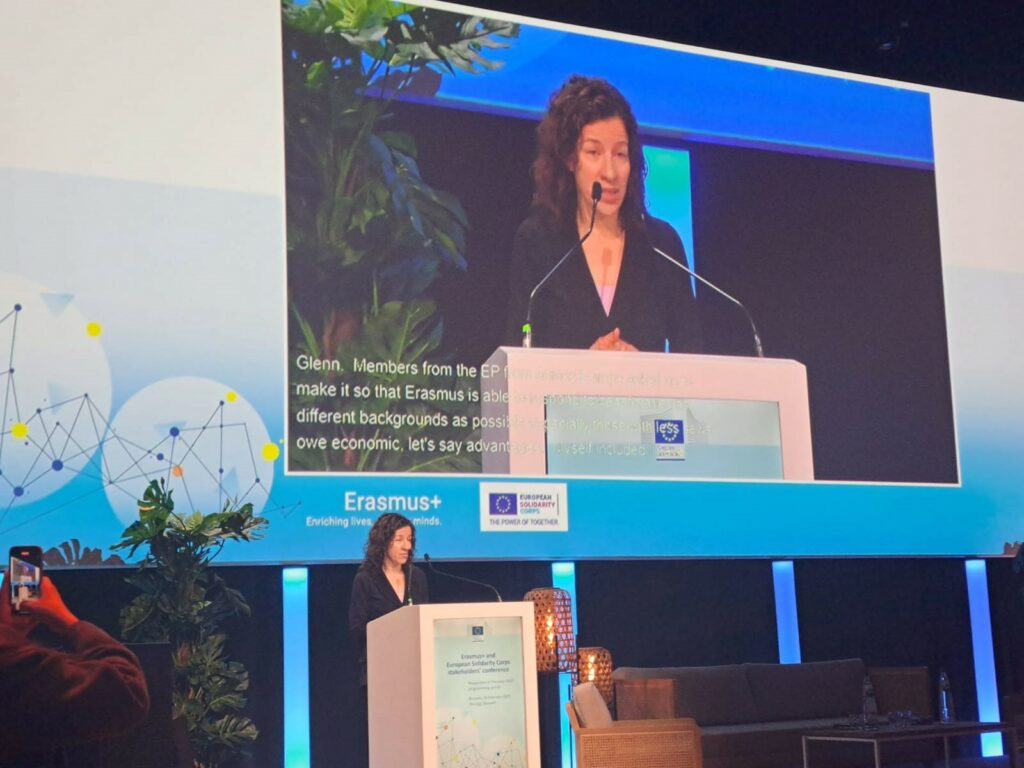Erasmus+ and European Solidarity Corps stakeholders’ consultation conference in Brussels
19/02/2025

On 18 February 2025, stakeholders from across Europe (representatives from National Agencies and Ministries; EU institutions; Education providers and European associations) gathered to discuss the future of the Erasmus programme and its role in fostering inclusiveness, skills development, and European values. EARLALL was invited to participate in this event alongside other key stakeholders in the education and training sector. The event, which featured the participation of European Commission Executive Vice President Roxana Mînzatu and Commissioner Glenn Micallef, highlighted the transformative potential of Erasmus and its alignment with the upcoming Union of Skills initiative.
The day began with an opening plenary session, where Executive Vice President Mînzatu emphasized the need to make Erasmus more inclusive and accessible, particularly for individuals from disadvantaged backgrounds. She underscored the programme’s role as a catalyst for social mobility and its ability to empower individuals through education, training, and cultural exchange.
Mînzatu also provided a glimpse into the future, announcing the European Commission’s forthcoming Union of Skills communication, scheduled for March 5, 2025. This initiative will be built on four pillars, with Erasmus serving as a key support tool. One of the pillars focuses on basic skills, encompassing digital literacy, citizenship, and other essential competencies. Mînzatu stressed the importance of the Erasmus opportunities for adults, noting that lifelong learning is critical in an era of rapid technological and societal change.
She further highlighted Erasmus and the Union of Skills as vehicles for promoting EU leadership on the global stage and advancing European values. However, she acknowledged the challenges ahead, particularly the need to simplify the programme’s procedures to ensure greater accessibility and efficiency.
Two key instruments were identified as crucial to the success of the Union of Skills: the European University Alliances and the Centres of Vocational Excellence. These initiatives, Mînzatu explained, will play a pivotal role in fostering collaboration, innovation, and excellence across Europe’s education and training systems.
Commissioner Glenn Micallef echoed Mînzatu’s sentiments, urging participants to actively engage in shaping the future of Erasmus and the European Solidarity Corps. He emphasized the importance of inclusivity in the consultation process, stating that every voice matters in ensuring the programmes meet the needs of all citizens.
Micallef acknowledged the potential challenges posed by the next EU budget, which may be more limited than in previous years. Despite this, he reassured attendees that his team, in collaboration with Mînzatu’s cabinet, is committed to prioritizing initiatives under his portfolio. A dedicated team will be established to streamline future programmes, making them more focused, simpler, and impactful, ultimately enhancing the experience for beneficiaries.
Following the plenary, the event transitioned into a series of parallel workshops, where participants delved into various aspects of the Erasmus programme. These sessions provided a platform for stakeholders to share insights, address challenges, and explore innovative solutions to enhance the programme’s reach and effectiveness.
- Skills and Competitiveness: Discussions focused on aligning Erasmus with the needs of the labor market and enhancing the skills of participants to boost competitiveness.
- Inclusion and Outreach to a Wider Audience: Participants explored strategies to make Erasmus more accessible to underrepresented groups, including those from disadvantaged backgrounds.
- Participation, Citizenship, and EU Values: The session emphasized the role of Erasmus in promoting active citizenship and European values.
- Green and Digital Transition: Stakeholders discussed how Erasmus can support the EU’s green and digital transition goals.
- Simplification and Coherence: This workshop addressed the need to streamline Erasmus procedures to make the programme more user-friendly and efficient.
After a networking lunch, the afternoon workshops continued with a focus on:
- Mobility Opportunities: Participants explored ways to expand and enhance mobility opportunities within Erasmus.
- Cooperation Opportunities: Discussions centered on strengthening partnerships between educational institutions, businesses, and civil society organizations.
- Volunteering Opportunities: The session highlighted the importance of volunteering in fostering social cohesion and personal development.
- Policy Support, Impact, and Scaling Up: Stakeholders discussed how to maximize the impact of Erasmus and scale up successful initiatives.
- International Dimension and Enlargement: The workshop focused on expanding Erasmus’s global reach and its role in supporting EU enlargement.
The event concluded with a closing plenary session, where key takeaways from the workshops were shared. Participants expressed a renewed sense of purpose and determination to work together to strengthen Erasmus and ensure its alignment with the Union of Skills.
The insights shared by Mînzatu and Micallef, coupled with the collaborative spirit of the workshops, underscored the transformative potential of Erasmus. By simplifying procedures, expanding access, and fostering innovation, the programme can continue to serve as a beacon of inclusiveness, innovation, and European values.
[ssba-buttons]

